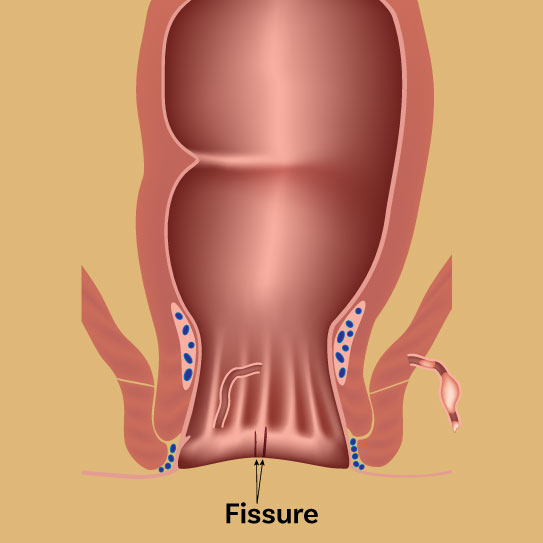Permanently Cure Anal Fissure with the Help of Pristyn Care
Now, you don’t have to rely on invasive open surgical procedures for the treatment of anal fissures and other anorectal diseases. At Pristyn Care we provide advanced fissure treatment in Mysore. The laser technology allows the surgeon to treat fissures in a non-invasive way. The laser beam emits light energy that promotes tissue regeneration and improves blood flow for faster healing of the fissure. As the fissure surgery doesn’t involve any cuts or stitches, there are no scars left afterward. If you are experiencing symptoms of anal fissure, then get it cured permanently with the help of Pristyn Care doctors.
Consult with Pristyn Care Doctors in Kochi for An Effective Solution for Fissures
Pristyn Care has a team of dedicated, trained, and certified proctologists and general surgeons who are skilled in diagnosing and treating anal fissures and other anorectal diseases. Our fissure doctors in Kochi have more than 8 years of experience. Through these years of practice, they have gained ample knowledge to mitigate the risks and complications associated with the procedure as well.
You can consult our doctors and discuss the problem without any hesitation. They will diagnose you and suggest some tests that will help to eliminate the possibility of other underlying medical conditions. The doctors will determine whether anal fissures can be resolved using medicines or need surgical treatment. Our doctors provide both medical and surgical treatment to provide permanent relief from the disease.
What happens when anal fissures are not treated?
Anal fissures are not a life-threatening problem, but they can take a long time to heal. In the acute stage, the fissure takes 4 to 6 weeks to heal entirely. But if you don’t follow a healthy diet and active lifestyle, the healing process gets disrupted and the symptoms persist. A fissure that doesn’t heal during this period becomes chronic and leads to other problems as well.
If a fissure is not treated on time, it can turn into an anal fistula and may cause anal stenosis. It can also increase the risk of anal cancer. Therefore, it is necessary that you seek proper treatment for anal fistula from expert doctors.
Choose Pristyn Care to Undergo Anal Fissure Surgery in Kochi
Pristyn Care is a multi-specialty daycare provider focused on providing best-in-class medical care and services for various diseases. This includes anorectal diseases like anal fissures. We employ modern laser technology and have a well-experienced team of surgeons skilled in laser-assisted procedures.
In addition to this, Pristyn Care pays attention to all the major and minor aspects of the treatment that simplify the surgical experience of the patients. We provide:
- Medical and surgical treatment at the top healthcare centers in Kochi.
- USFDA approved diagnostic and surgical tools that improve safety.
- Medical coordinators who handle all paperwork and formalities of the treatment.
- Free pick and drop service on the day of surgery.
- Assistance for hospital admission and discharge formalities.
- Flexible payment system with financing options like No-Cost EMI.
- Free post-surgery follow-ups and instructions for faster recovery.
At Pristyn Care, you won’t have to worry about the quality of medical care or financial hurdles. We make it easier for the people in Kochi to get advanced treatment for fissures.
Book an Appointment with Pristyn Care’s Associated Hospitals/Clinics
To book an appointment at the nearest Pristyn Care clinic in Kochi, you can either fill the book appointment form or give us a call. Our medical coordinators will schedule the consultation at our partnered hospitals or clinics closer to your location. You can visit the medical center at your convenience or opt for online consultation to discuss the treatment options with our medical experts.
How to relieve fissure itching?
Here are a few simple tips that can help you relieve fissure itching:
- Don’t scratch the fissure area. Scratching may irritate the skin. To find relief from the condition, you can apply compression to the area or take an oatmeal bath. You may want to scratch the area while in your sleep, so you should trim your nails to prevent hurting your area.
- Wear breathable cotton underwear. Wearing cotton undergarments will help you keep your area dry. Avoid wearing pantyhose and tight fit inner garments because it may trap moisture and irritate the skin.
- Clean your anal area gently – Use clean lukewarm plain water to your clean your anus. Use non-irritating mild soap. Do not scrub the area near your anal fissure. Make sure to clean the area with moist cotton balls or plain water if you have diarrhea or incontinence.
- Avoid irritants – Do not use anything like perfumed soaps, bubble baths, genital deodorats, or harsh wipes in and around your anal fissure. If you need to clean your fissure area, use unscented toilet paper.
- Watch your diet – Cut down on your intake of coffee, cola, spicy foods, citrus fruits, tomatoes or any food that may cause diarrhea. Don’t indulge in laxative overuse
- Use gels and ointments – You can use zinc oxide gels or ointments, vaseline petroleum jelly or hydrocortisone cream to find quick relief from the itching and irritating symptoms.
- Maintain firm bowel movements – Adding a lot of fiber to your regular diet can help you pass soft and timely bowel movements. For smooth bowel movements, you can also take help of fiber supplements such as psyllium (Metamucil) and methylcellulose (Citrucel).
What is the difference between anal fissure and anal fistula?
Anal fissure and anal fistula are two very common anorectal diseases. An anal fissure is a condition where an tear or a crack appearns in the skin near the anus. On the other hand, anal fistulas are tube-like passages that appears in the anal canal or the inner rectum. Most anal fissures are like paper cuts and ususally get healed within a few weeks. If left untreated, both anal fissure and anal fistula can develop into worse conditions. Untreated fistulas can even branch off into multiple openings.
The symptoms exhibited by both the conditions are very similar to each other. Pain in the anal area, discomfort while seating at the toilet seat and pain while passing a bowel movement, and blood in stools are some of the common symptoms for both anal fissure and anal fistula. But anal fistulas may also include pus secretion from the anal area, an extra opening near the anus or an increase in diarrhea.
Although different in nature, both the conditions require medical intervention. An anal fissure or anal fistula can be treated by a proctologist or an anorectal/ colorectal surgeon. At initial stages, both the diseases can be managed with medicines. But to treat the condition permanently, one would require a surgical approach, which can be done either through open surgery or laser surgery.









.svg)









